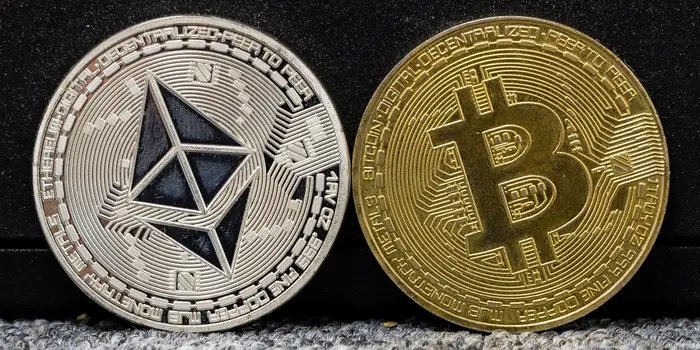


The cryptocurrency market has exploded in the past few years, driving huge amounts of interest in blockchain technologies and digital assets. The two largest cryptocurrencies, Bitcoin and Ethereum, have dominated the landscape and attracted the most attention from investors. But which one is the better investment opportunity going forward?
The Case for Bitcoin
Bitcoin is the more established digital currency. Launched in 2009, Bitcoin has a longer track record and much greater mainstream recognition and adoption. It is considered “digital gold” and is used primarily as a store of value. Some key points in favor of Bitcoin:
· First-mover advantage: Bitcoin was the first cryptocurrency and has the most users, largest market cap, and greatest brand recognition. This network effect creates staying power.
· Scarcity: The total supply of Bitcoin is capped at 21 million coins. This scarcity creates perceived value due to limited supply.
· Secure blockchain: The Bitcoin blockchain is very secure and the network has never been hacked. Bitcoin has shown to be a very stable protocol for sending and receiving digital payments.
However, Bitcoin also has some downsides:
· Slow transaction times: Bitcoin transactions can take 10 minutes or more to clear and confirm. This makes it unsuitable for most daily transactions.
· High fees: When the network is congested, Bitcoin transaction fees can spike dramatically. This unpredictability is a barrier for most casual users and smaller transactions.
· Deflationary: Bitcoin is designed to be deflationary, meaning the value of money increases over time. This encourages hoarding and discourages spending, which is bad for mainstream adoption.
· Volatility: The price of Bitcoin can swing wildly up and down. This extreme volatility makes it high risk and unsuitable as a store of value for most.
The Case for Ethereum
Ethereum is a blockchain platform for decentralized apps and smart contracts. Launched in 2015, Ethereum allows developers to build other cryptocurrencies and digital assets on top of its blockchain. Some reasons to consider Ethereum:
· Innovative blockchain: Ethereum's blockchain focuses on running programming code of any decentralized application. This provides more functionality and potential use cases than just a digital currency.
· Faster transactions: Ethereum transactions clear much faster than Bitcoin, taking around 15 seconds. This makes Ethereum more suitable for digital payments and transactions.
· Lower fees: Transaction fees on Ethereum are much lower than Bitcoin. The average Ethereum transaction fee is just a fraction of a cent.
· Smart contracts: Ethereum allows for smart contracts - programmed agreements that automatically execute based on real-world data. This has many applications from finance and insurance to supply chain management.
· Growing development: Ethereum has the largest ecosystem of developers building on its platform. This growing development will drive future innovation and use cases for Ethereum.
However, there are also risks and downsides to consider with Ethereum:
· Less decentralized: Ethereum mining is dominated by just a few large mining pools, unlike the vast network of miners on Bitcoin. This could increase the potential for network control and manipulation.
· Complex technology: Ethereum's platform is still quite complex for mainstream users and developers. This steep learning curve slows mainstream adoption.
· Volatility: Like Bitcoin, the price of Ethereum is highly volatile. Ether, the native currency of Ethereum, fluctuates wildly in value from day to day. This makes it risky for investors.
Ethereum vs. Bitcoin:
Bitcoin is a safer short-term investment but Ethereum has more long-term potential. Bitcoin is less risky due to its longer track record and greater stability. However, its growth may be limited in the coming years due to its limited functionality beyond digital gold. Ethereum is riskier but has the potential for much greater gains long-term if it achieves mainstream adoption. For this reason, a balanced portfolio with both assets is a good hedge.
Bitcoin vs Ethereum is like comparing gold to oil. Bitcoin is like gold - it's digital gold. Its value comes from scarcity and perception as a store of value. Ethereum is like oil - it powers other assets and has many more practical use cases. Just like oil, the growth and adoption of the things it powers fuel its own value. This analogy is helpful for understanding the key differences in the assets.
Bitcoin and Ethereum could eventually co-exist and thrive. The rivalry between Bitcoin and Ethereum communities obscures the fact that they could eventually serve different purposes and drive mainstream adoption of digital assets together. Bitcoin could remain as a digital store of value and hedge against fiat inflation, while Ethereum powers decentralized finance (DeFi) apps and other blockchain-based services. Interoperability may eventually allow them to be used in conjunction.
Pay close attention to Ethereum Upgrade and its impact. The next major upgrade to the Ethereum blockchain promises to solve some of its current issues like slow transaction speeds and high fees. If successful, it could significantly boost Ethereum adoption and potential value. However, the transition also poses risks if there are setbacks or flaws in the new system.
Conclusion
While Bitcoin and Ethereum are both promising cryptocurrency investments, Ethereum is likely the better option going forward due to its greater potential and more innovative blockchain. That said, both are high-risk, volatile assets, so only invest money that you can afford to lose. Diversification and long-term holding are the best strategies for investing in cryptocurrencies.
Bitcoin and Ethereum should be evaluated based on your risk tolerance and investment goals. For safety and stability, Bitcoin comes out ahead. For a high-risk, high-reward opportunity, Ethereum is the better bet due to its greater growth potential. With the volatility and uncertainty surrounding cryptocurrencies, diversification is always a good strategy. Balancing positions in both digital assets can allow investors to hedge risks while still capturing major gains as the technology progresses.
